Valve Cover Victory: DIY Porsche Valve Cover Replacement Guide
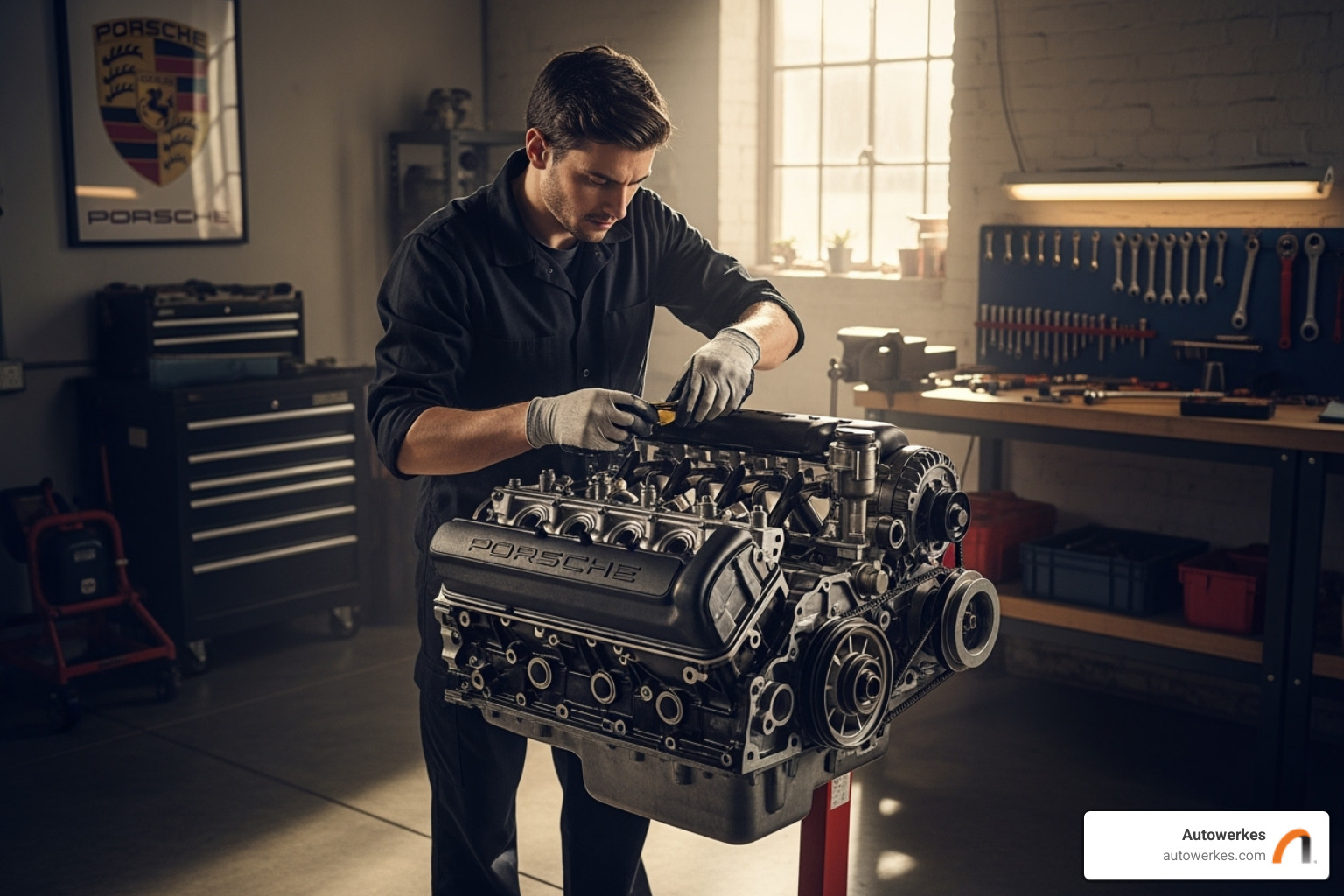
Introduction: Is Your Porsche Leaking Oil?
A Porsche valve cover replacement is a common task for many owners. This repair fixes oil leaks from your engine.
Here’s why it's often needed:
- Failing Gaskets: Over time, engine heat and oil make the valve cover gaskets hard and brittle. They crack and start to leak.
- Common Symptoms: You might see oil spots under your car, or notice oily valve covers. A burning oil smell, especially when driving, is a big sign. Sometimes, oil even gets into the spark plug holes, causing engine misfires.
- Why It Matters: Leaking oil isn't just messy. It can damage other engine parts and even lead to bigger, more expensive problems down the road.
As one owner shared, "In our case, these gaskets crumbled when I pulled at them." This shows how old gaskets can fail. Fixing them helps keep your Porsche running clean and strong.
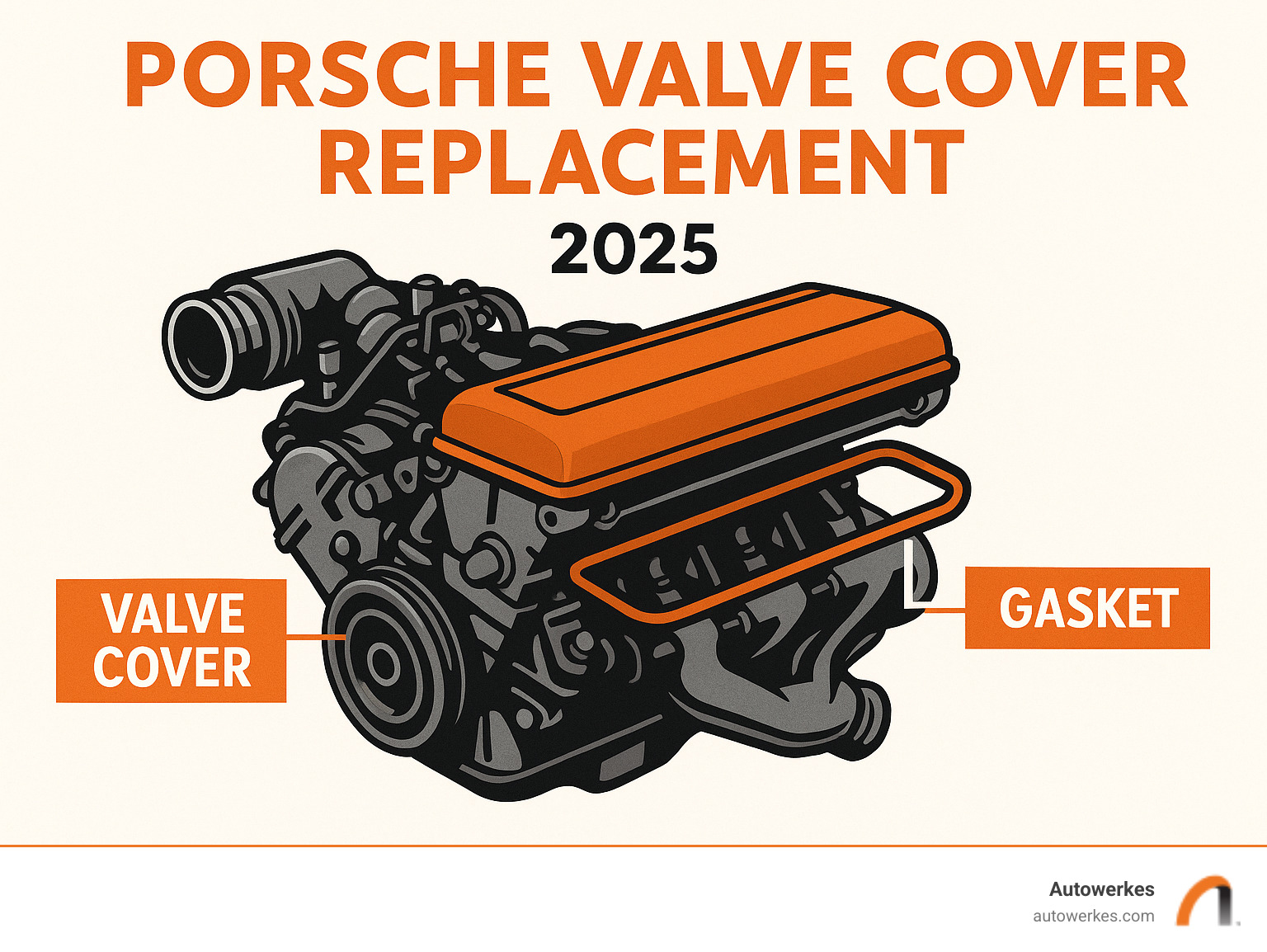
Porsche valve cover replacement word guide:
Your Complete Guide to Porsche Valve Cover Replacement
Spotting the Symptoms: When to Replace Your Valve Cover Gasket
When it comes to your Porsche, recognizing the early signs of a failing valve cover gasket can save you from bigger headaches down the road. We've seen these symptoms countless times, and they're usually quite clear.
The most common indicator is visible oil leaks. You might notice fresh oil spots on your garage floor or driveway, especially after the car has been sitting. Inspecting the engine bay, you'll often see oily residue around the valve covers themselves. This "sweating" or "weeping" of oil is a classic sign the gasket is no longer holding its seal.
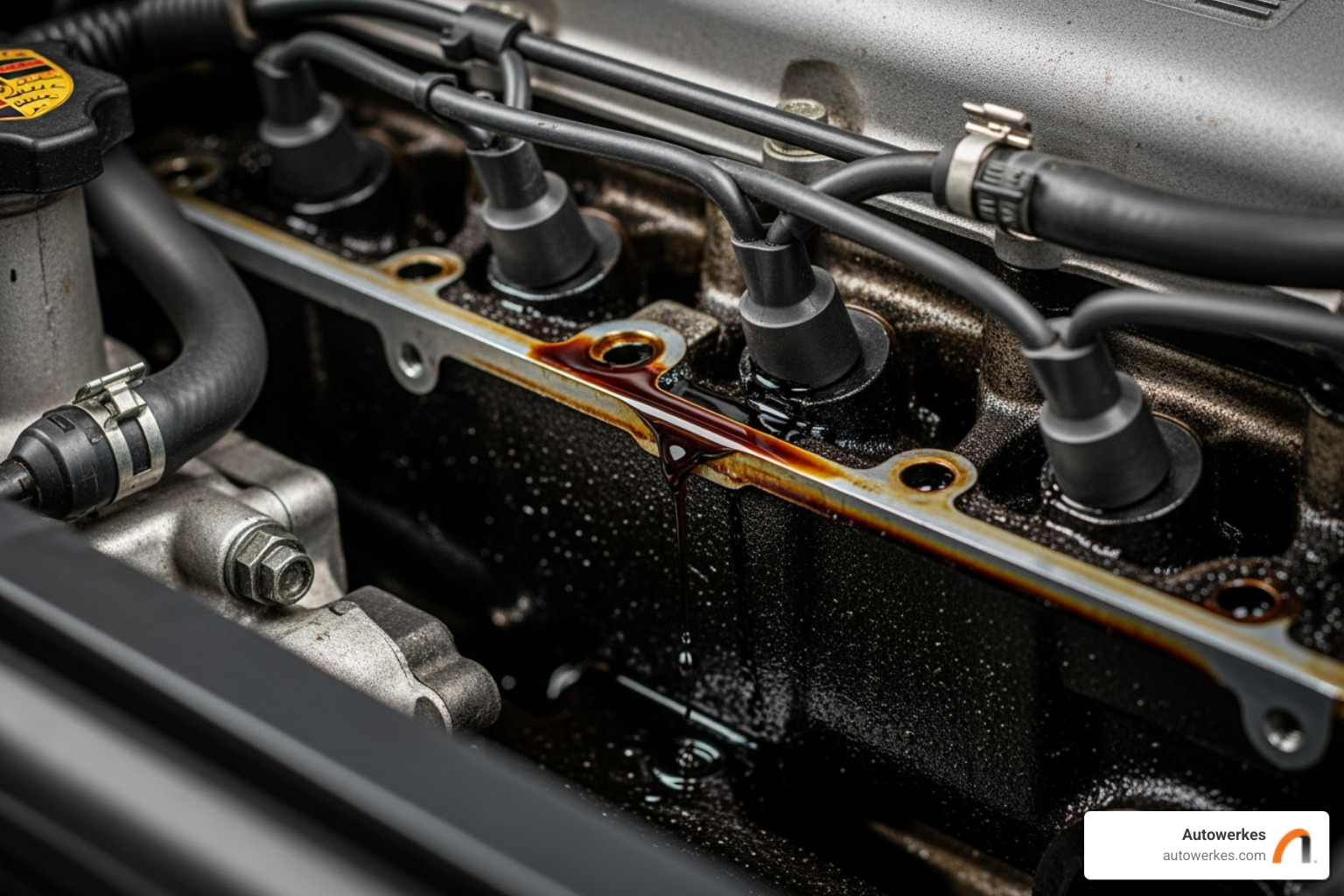
Beyond the visible evidence, a burning oil smell is a strong symptom. This happens when oil drips onto hot exhaust components, creating a distinct odor that can sometimes even make its way into the cabin. Some owners report seeing smoke from the engine area, particularly from the passenger side, which is often a direct result of oil burning off the hot surfaces.
Another critical sign is oil in the spark plug wells. The valve cover gaskets also seal around the spark plug tubes. If these seals fail, oil can seep into the spark plug holes, potentially leading to misfires as the oil fouls the spark plugs. This can cause rough idling or a noticeable loss of engine performance.
These gaskets don't last forever. Over time, engine heat and oil cause them to harden and become brittle. We've observed gaskets failing at various mileage points, with some reports of seals becoming dry and brittle as early as 56,000 miles, and others hardening after 130,000+ miles. One user even reported needing to replace theirs every two years, highlighting that gasket failure can be a recurring issue for some vehicles. If you're experiencing any of these symptoms, it's time to consider a Porsche valve cover replacement.
DIY vs. Professional: Is This a Job for Your Garage?
The question of whether to tackle a Porsche valve cover replacement yourself or bring it to a professional is a significant one. While some brave DIY enthusiasts take on this challenge, we often advise caution due to the complexity involved.
This job is often rated a 5 out of 5 stars for difficulty. Why so challenging? It's often described as a "major PITA" (pain in the you-know-what) and "a bit PITA" due to the meticulous nature of the work. It's not just about unbolting and rebolting; it's a tedious job involving many awkward fasteners in tight spaces. We've heard anecdotes of mechanics needing "some special tools and special words" (read: profanity) to access certain bolts!
The time commitment is also substantial. While some estimates suggest around 5 hours for the project, many DIYers report spending much longer. One user noted 5 hours for the driver's side and 3-4 hours for the passenger side on a Cayenne Turbo S, while another spent nearly 2 days completing the repair, including ancillary fixes. This suggests that for a first-timer, this isn't a quick weekend afternoon project. The high risk of error also looms large; stripping bolts, damaging brittle plastic components, or improperly sealing surfaces can lead to more expensive repairs down the line.
Given these challenges, we believe that for most Porsche owners, a professional Porsche valve cover replacement offers peace of mind and ensures the job is done right. Our certified technicians at Autowerkes, serving Huntington Beach and surrounding areas, have the specialized tools, extensive experience, and advanced diagnostic procedures to handle these intricate repairs efficiently and effectively. Trusting our experts ensures the best results, protecting your investment and getting you back on the road with confidence.
Gearing Up: Essential Tools, Parts, and Costs
Before starting on a Porsche valve cover replacement, whether you're a seasoned DIYer or just curious about what the job entails, it's crucial to understand the tools and parts involved. This isn't a job you can do with a basic wrench set from your local hardware store.
You'll definitely need a quality Torx driver set, as many Porsche fasteners are Torx. For those extremely tight spots where a regular ratchet won't fit, a very low-profile bit ratchet is critical. You'll also find U-joints and various extensions indispensable for reaching hidden bolts—one user even noted they "just could not get anything in there except a 1/4" drive T30 Torx socket on a u-joint." Additionally, you'll need oil-resistant gasket maker (sealant), like Dreibond/Threebond or a high-temp silicone such as Permatex Ultra Black, to apply at specific "parting lines." Don't forget pick tools for removing old, brittle gaskets and a torque wrench for tightening bolts to factory specifications (typically 10Nm or 7.5 ft/lbs).
A low-profile ratchet and bit set is crucial for tight spaces. If you're unsure about the right tools for your specific Porsche model, our experts at Autowerkes can provide guidance.
When it comes to parts, you'll need new valve cover gaskets, and often, new spark plug tube seals. A genuine Porsche gasket kit can include these and other necessary seals. Investing in quality gaskets is paramount for a lasting seal.
Regarding costs, it's important to understand that prices vary significantly based on the specific Porsche model and engine type. For a professional repair, parts can range from approximately $100 to over $400, with labor costs typically falling between $315 and $620. This can bring the total cost anywhere from around $415 to over $1,600, depending on your vehicle's specific needs. While a DIY approach might seem cheaper initially, the time commitment, potential for error, and lack of warranty often make professional service a more cost-effective and reliable choice in the long run. At Autowerkes, we ensure transparent pricing and unparalleled service for your Porsche in Huntington Beach and surrounding areas.
The "While You're In There" Checklist for Your Porsche
When undertaking a Porsche valve cover replacement, it’s a golden opportunity to address other components that are either easily accessible once the valve cover is off or are prone to failure around the same time. This "while you're in there" checklist can save you time, money, and future headaches.
Here are some critical items we recommend inspecting and potentially replacing:
- Spark Plugs and Ignition Coils: Since these components need to be removed to access the valve covers, it's an ideal time to replace them, especially if they haven't been serviced recently. This ensures optimal combustion and prevents misfires.
- PCV Valve and Hoses: The Positive Crankcase Ventilation (PCV) system is often integrated with or routed near the valve covers. These components, particularly the hoses, are known to become brittle over time due to heat exposure. We've seen PCV tubes literally crumble during removal! Replacing them now, or even re-plumbing with durable alternatives like heater hose, can prevent future vacuum leaks and excessive crankcase pressure. The PCV diaphragm, sometimes non-serviceable by Porsche, can also be a source of vacuum leaks and might have aftermarket repair kits available.
- Brittle Vacuum Lines: Similar to PCV hoses, other vacuum lines in the vicinity can become hardened and prone to cracking. Inspecting and replacing any questionable lines helps maintain proper engine operation and prevents hard-to-diagnose vacuum leaks.
- Camshaft Adjuster Seals: These small seals are typically inexpensive but can only be accessed with the valve cover removed. Replacing them is a smart preventative measure, as their failure can lead to oil leaks.
- Torque Arm Inspection: On some models, the torque arm might be in the way or easily accessible. Inspecting its bushings for wear is a good idea.
Addressing these items concurrently with your Porsche valve cover replacement streamlines the repair process, as much of the labor for these additional tasks overlaps. It's part of our comprehensive approach to Porsche maintenance, ensuring your vehicle remains in peak condition. Learn more about our expert Porsche repair and preventative maintenance services.
The Critical Steps and Common Pitfalls of a Porsche Valve Cover Replacement
A Porsche valve cover replacement is not for the faint of heart. It's a job that demands patience, precision, and a good understanding of the engine's layout. We've seen many challenges arise during this process, and knowing them beforehand can make a world of difference.
The repair begins with carefully disconnecting components that obstruct access. This includes various wiring harnesses, electrical connectors (like those for camshaft adjusters and the throttle body), and air hose connections. Moving these delicate parts without damaging them is crucial.
Next, you'll often need to remove airboxes and brackets, such as the air injection pumps and their mounting brackets, to gain sufficient clearance. As one experienced DIYer noted, they were "stunned that isn't in the Porsche service manual," suggesting it's a practical necessity often overlooked in official guides.
A major hurdle is accessing hidden bolts. Porsche engines are tightly packed, and some valve cover bolts are incredibly difficult to reach. The lower back corner bolt, especially on the left valve cover, is notoriously challenging. This is where those specialized low-profile tools and U-joints become indispensable.
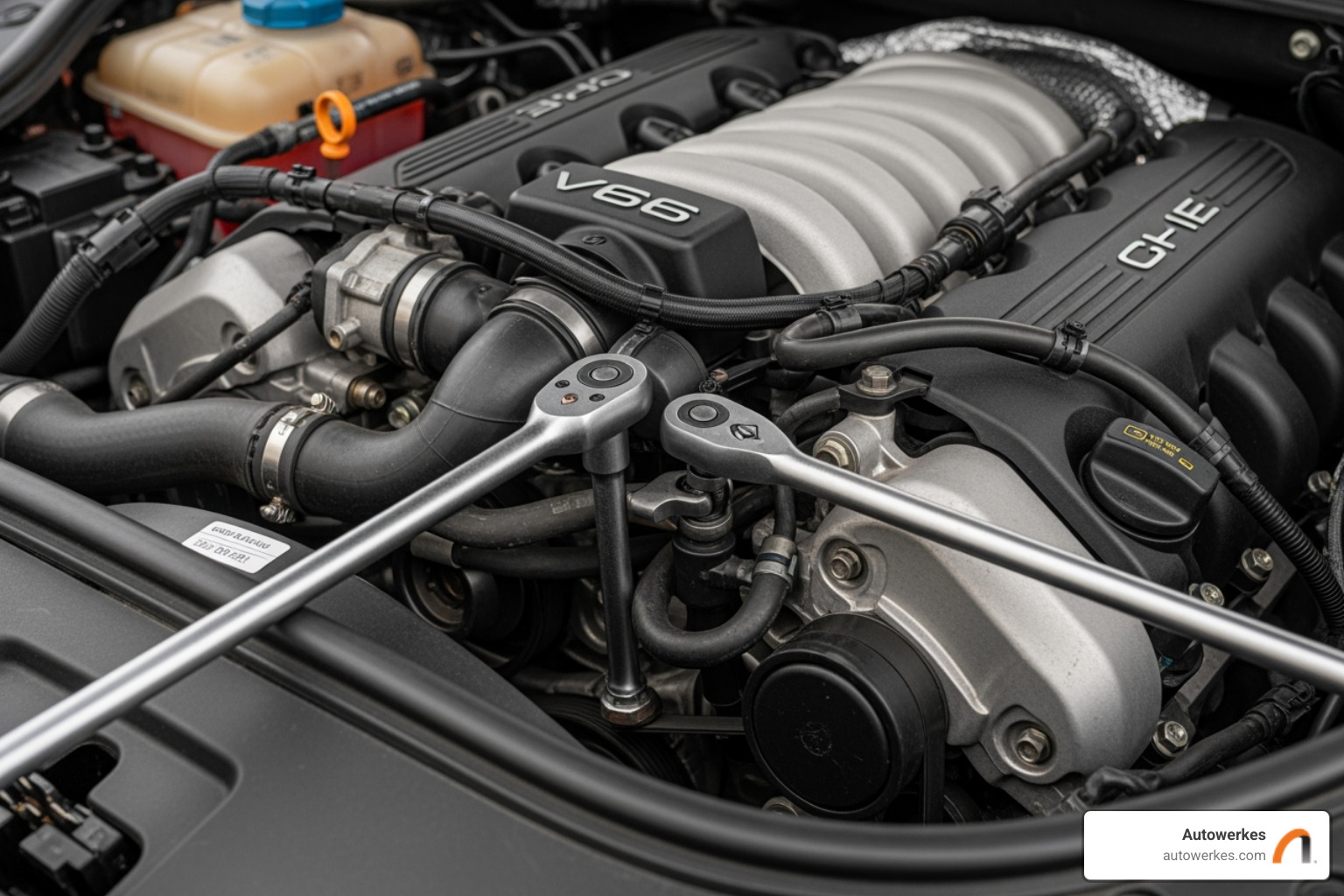
One specific challenge that often frustrates DIYers is the AC compressor wire on the driver's side. It can be routed in such a way that it significantly impedes valve cover removal. Some individuals have even considered cutting and re-soldering the wire to save time, though we always recommend the least invasive methods possible.
Throughout the process, watch out for brittle plastic parts breaking. Hoses, connectors, and mounting clips, particularly on older Porsches, become very fragile with age and heat. The PCV tubes are a prime example, often snapping during removal. Being gentle and having replacement parts on hand is key.
Most importantly, you must be extremely careful to protect delicate camshaft fingers. These small protrusions trigger camshaft position sensors, and bending or breaking them can lead to expensive camshaft replacement. Always lift the valve cover straight up when removing it and lower it straight down during installation to avoid damaging these critical components. The complexity of Porsche engine repairs and why experience matters cannot be overstated. These cars are engineering marvels, and their intricate designs require a skilled hand to ensure everything is put back together perfectly.
Ensuring a Perfect Seal and Flawless Performance
How to Guarantee a Leak-Free Finish
After all the hard work of removing and replacing your Porsche's valve covers, the very last steps are the most important. This is where attention to detail really shines. These final actions are key to making sure your Porsche valve cover replacement truly lasts and stays leak-free.
First, thoroughly cleaning mating surfaces is a must. Think of it like preparing a surface for painting – you wouldn't paint over dirt! Any old gasket pieces, hardened oil, or grime left on the cylinder head or the valve cover itself can stop the new gasket from sealing properly. Our team makes sure these surfaces are perfectly clean, giving your new gasket the best possible start.
Next comes proper gasket maker application. While many gaskets go on dry, Porsche often calls for a thin line of sealant, like Dreibond (or Threebond) or a high-temp silicone such as Permatex Ultra Black. This sealant is only needed at specific "parting lines," usually where the timing cover meets the engine block. It’s crucial to apply sealant only at these parting lines and use just a tiny amount. Using too much can be a big problem. It might squeeze into your engine and clog oil passages, or make it incredibly tough to remove the gasket next time. Less is definitely more here!
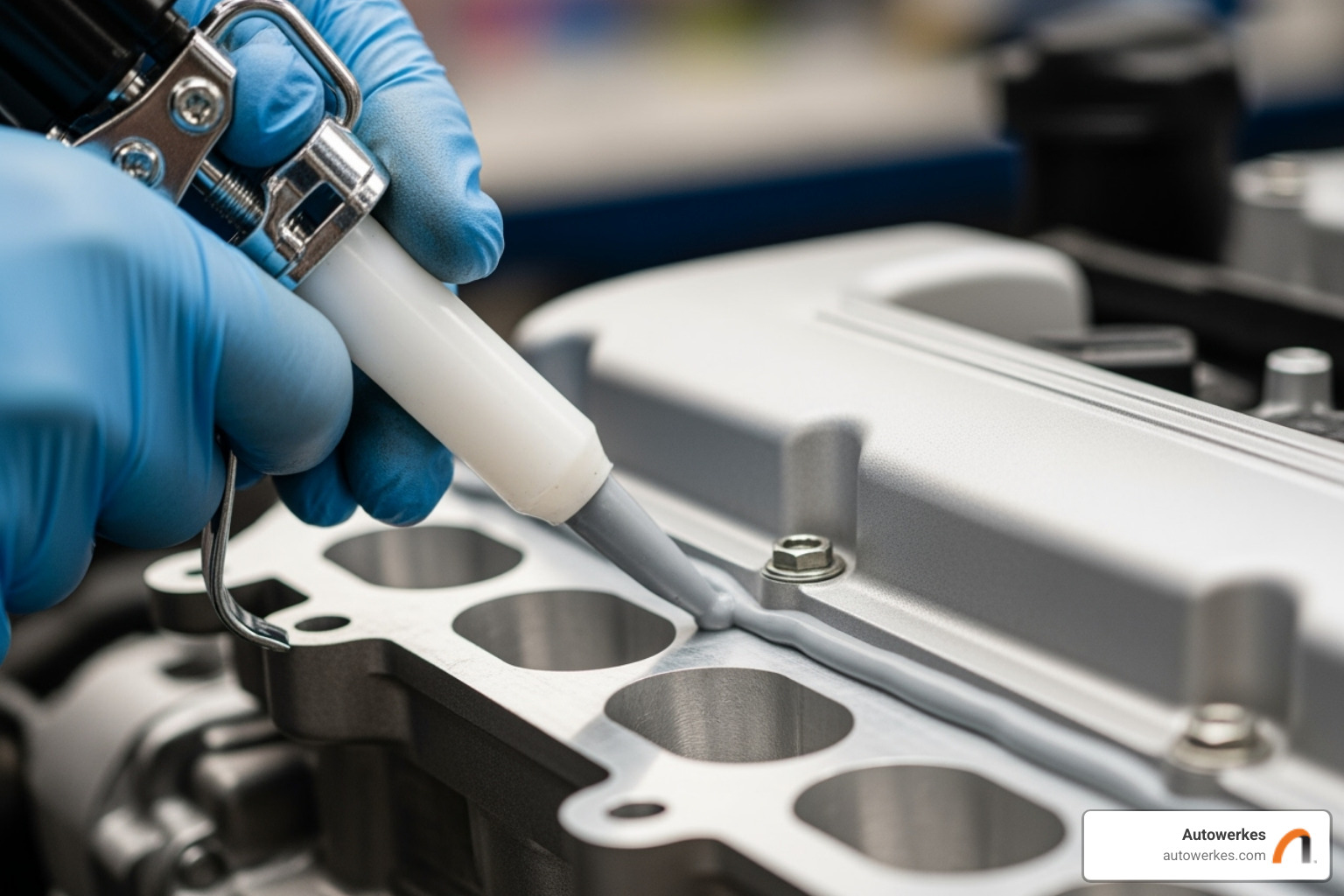
Making sure the correct gasket seating is also vital. New gaskets often have little tabs that fit into grooves on the valve cover, holding them perfectly in place. We always double-check that they are fully seated, not twisted, or pinched before we put everything back together.
Finally, following bolt torque sequence and adhering to torque specification are critical. Porsche specifies a crisscross pattern for tightening valve cover bolts. This makes sure the pressure is spread evenly across the gasket. The typical torque for these bolts is 10Nm (or 7.5 ft-lbs). Using a torque wrench and sticking to this exact value prevents leaks from bolts that are too loose, and also stops you from damaging the valve cover or stripping threads by overtightening. After the valve cover is installed, we let the sealant cure for the recommended time (often 24 hours) before starting the engine. This helps create a super strong seal.
As we've seen, the job complexity and high risks of DIY for a Porsche valve cover replacement are quite high. The precision required for cleaning, applying sealant, and torquing bolts is exactly where professional Autowerkes expertise truly shines. Our certified technicians in Huntington Beach, Newport Beach, Fountain Valley, Palos Verdes, Manhattan Beach, Los Angeles, Irvine, Mission Viejo, Laguna Beach, and San Diego have the experience and special tools to do this repair with careful attention to every detail. We make sure your Porsche gets a proper, long-lasting seal, preventing future leaks. For expert Porsche auto repair in Huntington Beach, trust the certified technicians at Autowerkes to get the job done right the first time. Schedule your appointment today!

.svg)




